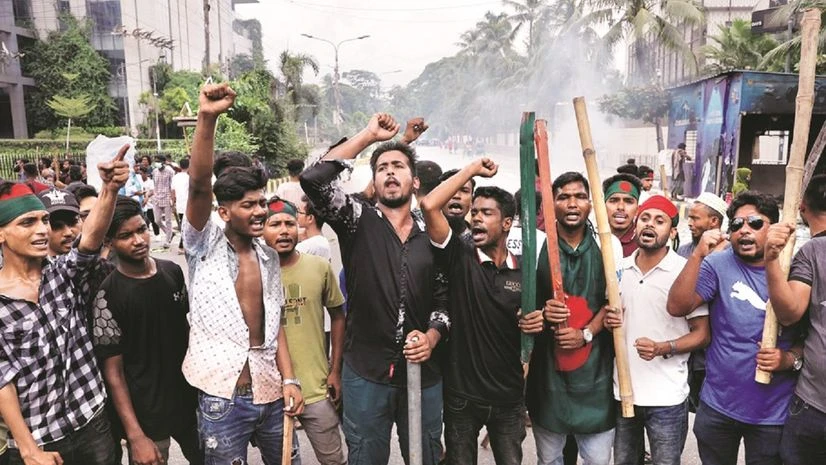)
Protesters hit the streets in Dhaka PHOTO: REUTERS
Student protests in Bangladesh have escalated as demonstrators surrounded the Supreme Court (SC), demanding the resignation of Chief Justice Obaidul Hassan and the judges of the appellate division. The protests, led by the Anti-Discrimination Student Movement, have issued an ultimatum for the resignations by 1:00PM today, threatening to besiege the judges’ residences if their demands are not met, according to Bangladeshi newspaper The Daily Star.
The fresh protests were triggered after the Chief Justice called a full-court meeting without consulting the newly formed interim government.
Around 10:30 AM, hundreds of protesters, including students and lawyers, began gathering on the Supreme Court premises to express their discontent. The movement has gained momentum, with Asif Mahmud, adviser of the Youth and Sports Ministry in the interim government, also calling for the unconditional resignation of Chief Justice Hassan and an end to the full court meeting.
In response to the growing unrest, Chief Justice Hassan has postponed the full court meeting, which was set to decide whether the court’s functions would continue virtually.
Background on Bangladesh unrest
Nationwide protests broke out in Bangladesh as the government attempted to increase the 10 per cent quota in government jobs to 56 per cent. The protests turned violent and eventually led to the country retracting the quota. However, after hundreds of deaths, these demonstrations, largely led by students, demanded Prime Minister Sheikh Hasina’s resignation and turned deadly as clashes between police, pro-government supporters, and demonstrators escalated. Reports indicate that more than 350 people have been killed since July.
Hasina, one of Asia’s longest-serving leaders, resigned and fled the country on August 5. She is currently camping in India.
Hasina, who won a controversial fourth term in January elections boycotted by the Opposition, has long faced accusations of rigging elections and maintaining an iron grip on power. The Bangladesh Nationalist Party (BNP), the main Opposition party, has since called for Hasina to face criminal charges, including allegations of murder, forced disappearance, money laundering, and corruption.
Interim govt in Bangladesh
In the aftermath of Hasina’s resignation, an interim government was installed on Thursday, led by Nobel Prize-winning economist Muhammad Yunus. According to the constitution, a new election must be called within 90 days, though the timeline remains uncertain. The interim government, supported by the military, has not yet commented on when elections might be held.
The political landscape in Bangladesh remains tense, with the ongoing protests and demands for justice.
First Published: Aug 10 2024 | 12:49 PM IST





